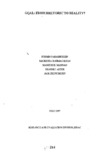| dc.contributor.author | Farashuddin, Fehmin | |
| dc.contributor.author | Khan, Mahmuda Rahman | |
| dc.contributor.author | Mannan, Manzurul | |
| dc.contributor.author | Akter, Shahnuz | |
| dc.contributor.author | Chowdhury, AMR | |
| dc.date.accessioned | 2019-12-08T10:35:00Z | |
| dc.date.available | 2019-12-08T10:35:00Z | |
| dc.date.issued | 1997-07 | |
| dc.identifier.citation | Farashuddin, F., Khan, M. R., Mannan, M., Akter, S., & Chowdhury, A. (1997, July). GQAL: from rhetoric to reality. Research Reports (1997): Social Studies, Vol – XVI, 264–308. | en_US |
| dc.identifier.uri | http://hdl.handle.net/10361/13224 | |
| dc.description.abstract | BRAC's Gender Quality Action Learning (GQAL) Progranune was initiated in 1994 to
improve the quality of programmes with village women and to improve the quality of
. gender relations within BR.AC. In its first year of intervention, GQAL covered 28 area
offices of BRAC's Rural Development Programme and 8 area offices of the Health and
Population Division. This short term process documentation of the GQAL programme
aimed at finding out whether GQAL's operations have reflected its stated objectives;
whether the gend~essages in GQAL 's documents have been reflected in its operations
and what the Strel\:,oths and weaknesses of the programme are after its first year of
operation. Information for the study was collected through re'\liew of GQAL documents,
discussions with members of the Core Gender Team, participant observation of GQAL
intervention sessions in area offices, group discussions and infonna.l interviews with area
office staff participating in GQAL, and participant observation of GQAL facilitators'
monthly meetings. Since this was not an evaluation of the programme, no
recommendations have been made. However, several implications for future action have
been identified, as follows: GQAL has created a forum for discussion but it needs to
. specify whether this is solely a 'gender' forum and whether there are mechanisms for
institutionalizing this forum. The GQAL manual provides many useful •gender' messages,
but these messages should be made more specific to the context of BRAC. The GQAL
programme is ideally a gender redistributive / transformative form of training. But can it
bring about significant changes within the existing context of programme concern? In its
:first year of interventions, GQAL focussed primarily on its second goal, that of improving
gender relations within BRAC. It is now time for GQAL to address its first goal, that of
improving quality of programme with village women and it needs to specify what measures
will be undertaken to carry out this goal. Finally, GQAL needs to address the important
issue of whether all issues are gender issues and whether GQAL is sufficient in itself to
address all such issues. | en_US |
| dc.language.iso | en | en_US |
| dc.publisher | BRAC Research and Evaluation Division (RED) | en_US |
| dc.subject | Gender Quality Action Learning (GQAL) | en_US |
| dc.subject | BRAC | en_US |
| dc.subject | Gender equity | en_US |
| dc.subject.lcsh | Gender Quality Action Learning (Program) | |
| dc.subject.lcsh | Women in development -- Bangladesh. | |
| dc.subject.lcsh | Non-governmental organizations -- Bangladesh. | |
| dc.title | GQAL: from rhetoric to reality | en_US |
| dc.type | Research report | en_US |

